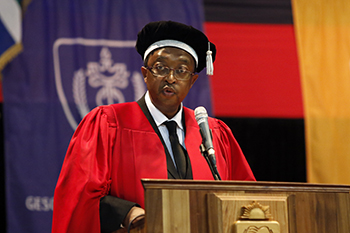
Dr Molapo Qhobela, CEO of the National Research
Foundation was the guest speaker at the
2016 Spring Graduation ceremonies on the
UFS Bloemfontein Campus.
Photo: Johan Roux
“The knowledge you receive, the skills and tools you have acquired, whether they are tools of time management, tenacity or brilliance, are what we as this emerging new society need to re-dream for the type of society we would like see in this country.”
These were the inspiring words of guest speaker Dr Molapo Qhobela to graduates of the University of the Free State (UFS) at the Spring Graduation ceremonies on 15 September 2016 in the Callie Human Centre on the Bloemfontein Campus. Dr Qhobela is the Chief Executive Officer of the National Research Foundation.
A total of 442 degrees, diplomas and certificates were conferred on graduates from six UFS faculties, namely the Faculties of Law, Humanities, Education, Health Sciences, Economic and Management Sciences and Natural and Agricultural Sciences.
Joyous atmosphere befitting a spring ceremony
The spirit at the spring ceremonies was truly inspiring, joyous and heart-warming. The jubilation from the audience as the procession entered the hall demonstrated the exhilaration of graduates and their families. The sense of accomplishment and pride reverberated as the graduates walked across the stage.
Graduates’ hard work and dedication applauded
“You endured what you had to
endure and you enjoyed what
had to be enjoyed.”
“You have worked incredibly hard and the privilege to walk across the red carpet only goes to those who were prepared to do the work,” Dr Khotso Mokhele, Chancellor of the UFS said.
He applauded graduates for the many hours and sacrifices they had to endure, saying: “You endured what you had to endure and you enjoyed what had to be enjoyed.” Dr Mokhele also mentioned the amazing Gold medal win at the 2016 Olympic Games in Rio de Janeiro of UFS star athlete, Wayde van Niekerk.
Distinctions awarded by the UFS.